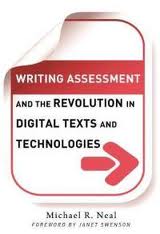Review Conversation
Neal weaves his students' experiences into his own as he describes what he has witnessed in classes he "floats" through in both secondary and University spaces. Jumping right in to the binary controversy of "keeping up" with technology or embracing it as a critical teaching tool, he draws me in with his discussion of literacies in 21st-century writing discourses. He moves a step further when he posits that individual teacher-student practice in digital writing is a relevant aspect of inquiry. He then questions what these practices mean when we discuss broader implications in our field as a whole, as well as the directions we want or need to move in as instructors of writing. I would say a keyword for Neal's Introduction is "tension."
In Chapter One, Neal presents premises and assumptions connected with defining writing assessments as technologies. The ways in which he defines the basic elements of technology as tools and how he describes a brief history of assessments as state-mandated objects appeal to me as an emerging composition scholar. These arguments pinpoint accountability and value of assessments as well as the social act of performing them in political contexts. He ends the chapter with a call for instructors to critically analyze digital media as part of institutional assessment technologies. Here he also channels Cynthia Selfe's synthesis of instrumentalism and determinism associated with these technologies within University writing programs.
